Korea's status nowadays is quite different from just a few decades ago, when it was an underdeveloped country. Yet Korea is still missing something.
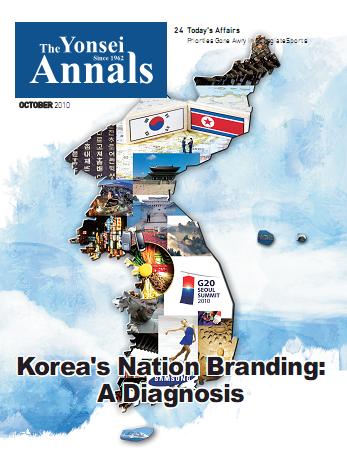 |
KOREA WILL be hosting the G20 Seoul Summit in November. Some regard this as a good opportunity for Korea to further enhance its reputation by taking the initiative in international affairs. Such an effort to promote a nation's image or reputation is known as "nation branding."
However, as Korea has attained its upgraded status in a relatively short period, people seem to hold different ideas about the necessity of nation branding, and the methods to achieve it. As the fifth G20 Summit takes place at Seoul next month, The Yonsei Annals explores Korea's nation branding by surveying 1,000 Yonseians.
How the nation branding issue came out
The term "nation branding" was first coined by Simon Anholt, an independent policy advisor who remarked on its importance by saying that "people around the world look at countries in very much the same way as we look at products and its brands." Nation branding is a somewhat vague concept, and might not seem very necessary. Yet in the long term, it may be very important. The nation you are from may affect the way people see you; the corporation you work for may earn more or less according to where it is from. In fact, a research conducted by Korea Trade-Investment Promotion Agency (KOTRA) shows that a correlation exists between foreigners' association of positive images with Korea and their higher evaluation of Korean products (see above). This means that not only quality products promote a nation's image, but also that foreigners who see Korea in a favorable light tend to attach a higher value to Korean products than those who have a negative image.
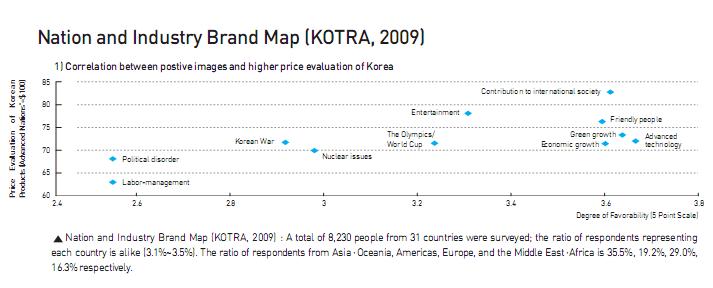 |
Nation branding is especially critical to Korea. Having already achieved a certain level of modernization, industrialization, and democratization, Korea is on the threshold of being considered as an advanced country. Yet it still falls behind nations like the United States, and at the same time is being threatened by developing nations like China, which are rapidly closing the gap. Unless Korea secures additional engines for growth, including a better nation brand, it will not be free from its "sandwiched situation." The issue becomes more urgent since the Korean economy is highly dependent on exports, according to Seo Jeong-min (Prof., Dept. of Middle East and African Studies, Graduate School of International and Area Studies, Hankuk Univ. of Foreign Studies). "Thus in order to survive, Korea should take a more meticulous and specialized approach to promoting its brand value," says Seo.
The belief that Korea needs to improve its brand image implies that Korea is either virtually unknown to outsiders, or has a negative image. According to the aforementioned study by KOTRA, this is most true outside of Asia and Oceania. While Korea is well-known and generally perceived positively in Asian regions, this is not so elsewhere in the world. Regarding the nationality of the brand Samsung, 79.2% of respondents in Asia and Oceania replied that Samsung is a Korean brand; in the Americas only 35.9% answered correctly, and more people (42.0%) answered that Samsung is a Japanese brand. Also, Korea's instable geopolitical position and its contentious relation to North Korea turn out to be a major factor depreciating Korea's brand value, especially in the Americas and Europe.
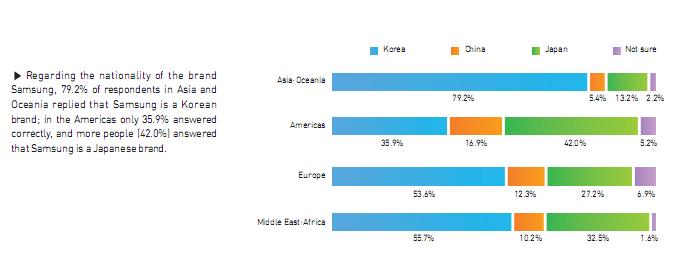 | ||
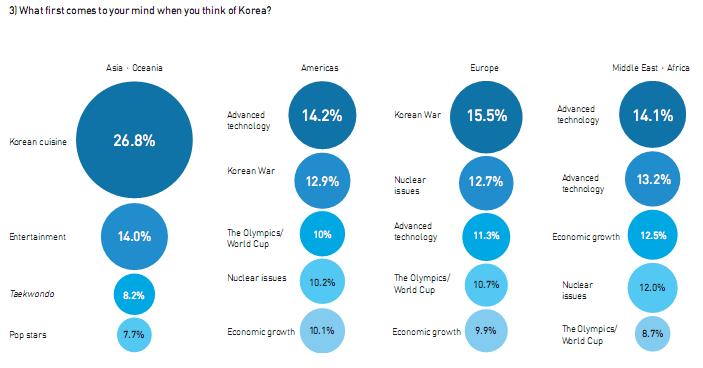 |
Korea does not have a positive image in press reports either. Hence, even though Korea is noted for achieving a considerable economic development in only a few decades (Korea's GDP ranked 15th among 200 countries* and its GDP growth rate ranked 5th among 30 OECD countries** in 2008), it fails to appeal to other nations and foreigners. Korea is not a popular country to immigrate to; based on aggregated surveys in 148 countries or areas between 2007 and early 2010 by Gallup, Korea ranked 50th in the Potential Net Migration Index (PNMI) score***. Furthermore, in Newsweek's recent study, "The World's Best Countries," Korea ranked 15th out of 100 countries overall. Although it ranked second in education and third in economic dynamism, Korea achieved worst results in other categories: health (29th), quality of life (23rd), and political environment (19th). Moreover, such rankings, reported by major presses with readers all over the world, have a negative influence on attitudes towards Korea.
The Korean government's approach to nation branding
government policies are criticized for setting aside basic values such as public welfare and freedom of speech under the pretext of improving Korea's nation brand. For example, some critics say that while carrying out the World Design Capital (WDC) Seoul 2010**** project, the inhabitants of the banks of the Han River were evicted. Another criticism is that gatherings in Seoul Plaza in central Seoul require prior approval from the authorities. Permission has only been granted for leisure and cultural activities, while political assemblies have been banned due to possible adverse effects. Seoul Mayor Oh Se-hoon had written on his blog, "Allowing unlawful and violent rallies on the plazas will depreciate Korea's image." However, it must be realized that infringing on such basic rights of the citizens ultimately has a negative effect on Korea's nation brand.
are high-tech and modern, yet it does not show how Korea is different from other countries. Guy Sorman, a French professor and public intellectual with expertise in philosophy and economics, has said, "Korea has a very weak image...if you have a strong cultural image, it is easier to promote products abroad because people will be attracted by Korean culture and by consequence, they will buy Korean products."
Seoul Design Fair, and Seoul Design Market.
The mixed attitudes of students towards nation branding
Interaction with foreign universities and students plays an important role in nation branding, and promoting a positive attitude towards Korea among foreigners is an effective way to enhance the nation's image. In order to upgrade the school to global standards, Yonsei University has been conducting the Yonsei International Summer School (YISS) since 1985, and the Korean Language Institute (KLI) offers programs that involve activities in which foreign students could learn about Korea. There are clubs such as Mentors and Yonsei Global in which Korean students help out foreign students who attend Yonsei University. Suh Yon-soo (Soph., Dept. of English Language & Lit.), a member of Mentors, says, "Recently we have developed new programs such as holding cheer-leading orientations to prior the Yon-Ko Athletic Meet. Plus, considering that the exchange students do not have much access to ordinary clubs on campus, we plan to make sub-clubs within Mentors for them."
There are university students who go abroad for volunteer work, improving Korea's nation brand. Especially with the Seoul G20 Summit around the corner, some students are preparing to help the event succeed. Kahng Jee-heun (Soph., Dept. of Political Science & Int. Relations, Korea Univ.) was the Korean delegate to "My Summit," the official youth summit for the G20 Toronto Summit held in June. "To me, the most memorable Canadians were those who participated with me in the summit - normal Canadian college students just like us...it was their enthusiasm and pride about their country that first comes to my mind now when I think about Canada. I think we Korean students could do the same."
Unfortunately, it is hard for students to give much thought to giving a positive image of Korea in the current school environment. In the survey, 56.3% of Yonseians answered that there is not much interaction with foreign students on campus, and 75.6% of them identified the fact that Korean and foreign students do not have much contact with one another as the foremost reason. Mostly surrounded by Korean students, it is quite difficult for Yonseians to feel concerned about national branding, unless they are genuinely interested in getting on good terms with the international students.
Furthermore, according to the aforementioned survey results, the importance of nation brand is not truly felt. Most Yonseians (86%) agree with the general idea that a better nation brand would benefit them in the future. However, the majority still says that Korea's good or bad image has not harmed or helped them in any way (86.5% and 89.5% respectively). This indicates that it would take more to have university students feel the importance of the nation branding issue.
The fundamental reason for university students' indifference lies in the fact that they are busy with the concerns of their everyday lives, such as seeking employment. Regarding this situation, Seo Kyoung-duk (Visiting Professor, Graduate School, Sungshin Women's Univ.), known above all as the freelance Korean publicist who promoted recognition of Hangeul and Korean cuisine as well as the Dokdo and East Sea issues through ads in international newspapers, says, "I wish students would take a long-term perspective and not just look to events like the G20 Summit. With social network services (SNS) prevalent nowadays, they should be willing to tell foreigners about Korea whenever they have the chance."
Meanwhile, Hwang Pyung-woo (Head, Korea Cultural Heritage Policy Research Institute) says that while students have been pushed to achieve good grades in school, education on Korean history or culture has been relatively deficient. "It is hard to expect university students who do not have the passion and pride in Korean values to actively promote Korea. There should be more investment in developing the humanities and cultural education. That way, students could cultivate basic insight into what is right and wrong, leading to a true nation brand that wells up from within," says Hwang.
Meanwhile, Hwang Pyung-woo (Head, Korea Cultural Heritage Policy Research Institute) says that while students have been pushed to achieve good grades in school, education on Korean history or culture has been relatively deficient. "It is hard to expect university students who do not have the passion and pride in Korean values to actively promote Korea. There should be more investment in developing the humanities and cultural education. That way, students could cultivate basic insight into what is right and wrong, leading to a true nation brand that wells up from within," says Hwang.
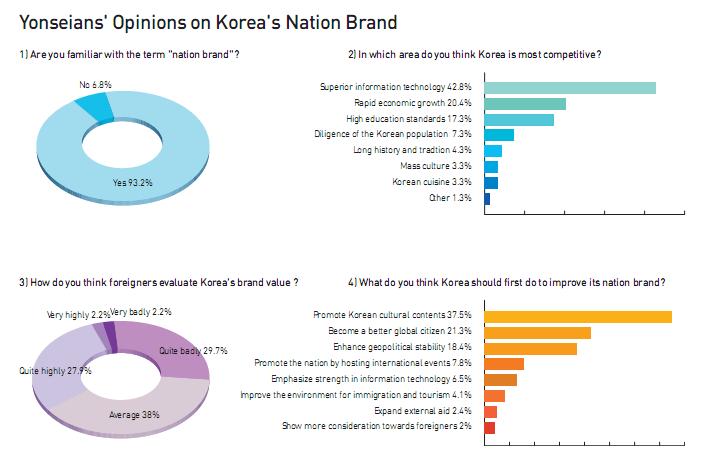 |
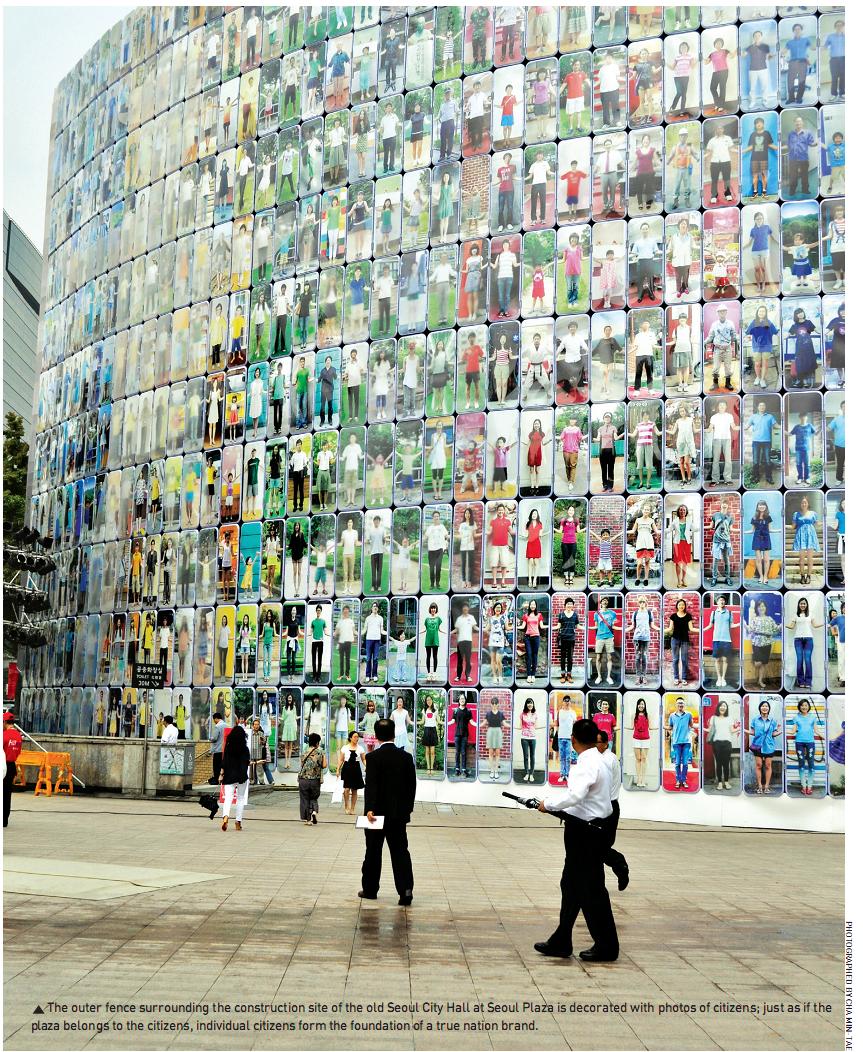
* * *
Nation brand is indeed an important issue in Korea, yet not everyone is able to appreciate its importance. Besides, the nation brand Korea shows to the international community should not be a mere "window dressing." For example, to successfully host the upcoming G20 Seoul Summit in November, the government is asking citizens to mind their global manners. At the same time, human right issues have emerged regarding the "cracking down" on illegal immigrants around the COEX where the summit is to be held, or the newly introduced body scanners at airports to prevent terrorism with the advent of the summit near. Such measures may be necessary in order to give a good impression to our guests, but it should not be forgotten that Korea will be judged not just according to the two days when the summit is held. It all starts from the basics. In fact, 42% of Yonseians say that university students could contribute to nation branding by leading a diligent life and being careful about how they behave. As to the question about who plays the most important role in nation branding, 33.1% chose "the government," but a similar percentage (30.9%) also chose "students and normal citizens." As Anholt emphasizes, "Places can't construct or manipulate their images with advertising or PR, slogans or logos...the only sure way places can change their images is by changing the way they make and do things, not the things they say."
Shin Joo-hyung
redflower1126@yonsei.ac.kr

